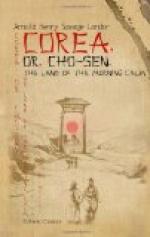The confusion was great. Some men were busy collecting the stones into heaps again, while others were running to and fro—going to fetch, or carrying, fresh ammunition to the front; and all the time the two armies were gradually approaching one another until at last they came together on the banks of the narrow stream. Here, considering the well-directed pelting of stones, it was difficult to say which army would succeed in dislodging the other. Those on the opposite side to where I was made a rush upon us, but were fired upon with such increased vigour that they were repulsed; then, however, concentrating their forces on one point, they made a fresh attack and broke right into our ranks, fighting corps a corps, and pushing back the men on my side, until the whole of their contingent was brought over to our side of the stream. I was not, of course, taking any active part in the fighting, but, seeing the bad turn the struggle was assuming, I made up my mind that I was destined to have my own skull broken before the fray was over. Though the duelling was fierce, however, each man being pitted against his opponent with clubs and drawn knives, and hammering or stabbing at him to his heart’s content, I, somehow, was in no way molested, except of course, that I was naturally much knocked about and bruised, and several times actually came in contact, and face to face, with the irate enemy.
If you can imagine eighteen hundred people fighting by twos in a comparatively limited space and all crowded together; if you can form an idea of the screaming, howling, and yelling in their excitement; and if you can depict the whole scene with its envelopment of dust, then you will have a fair notion of what that stone-fight was like. The fighting continued briskly for over three hours, and many a skull was smashed. Some fell and were trampled to death; others had very severe knife wounds; a few were killed right out. When the battle was over, few were found to have escaped without a bruise or a wound, and yet, after all, very few were actually killed, considering how viciously they fought. Indeed, there were in all only about half a dozen dead bodies left on the battle-field when the combatants departed to the sound of the “big bell” which announced the closing of the city gates.
After a long discussion on the part of the leaders, it was announced that the battle was to be considered a draw, and that it would, therefore, have to be renewed on the next afternoon. The argument, I was told, was that, though the other side had managed to penetrate the camp on my side, yet they had not been able to completely rout us, we having made a firm stand against them. For the following two or three days, however, it snowed heavily, and the fighting had to be postponed; and on the day it actually did take place, to my great sorrow, I was unable to attend, owing to a command to go to the palace. To my satisfaction I was subsequently informed that the plasterers, that is to say, my side, had ultimately come off victorious.




